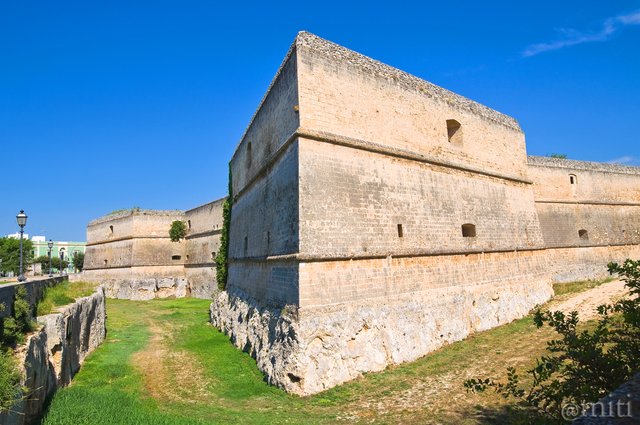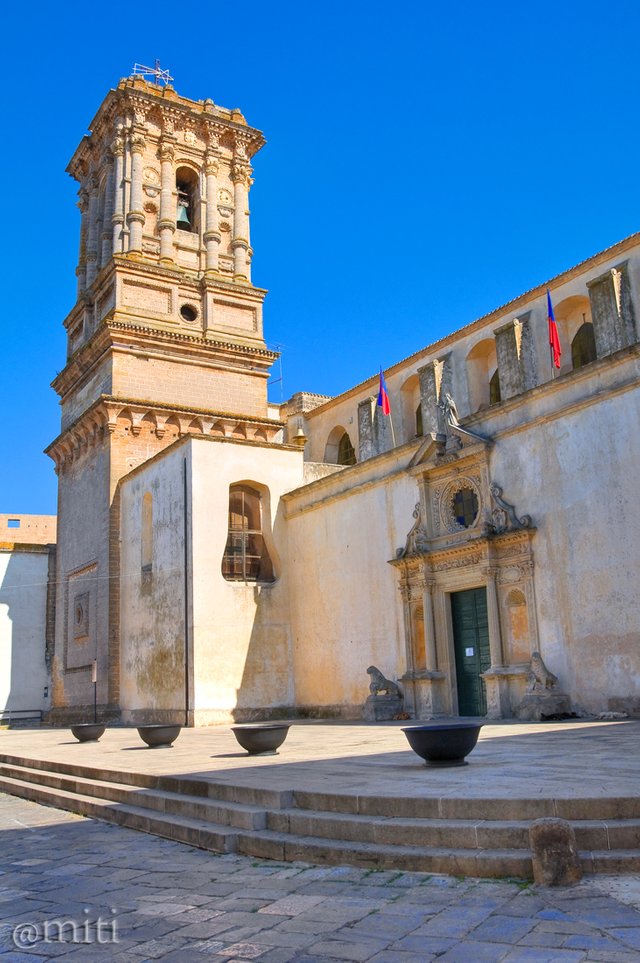A Journey through Italy: one photo every day #57 - COPERTINO [ENG/ITA]

The Copertino Castle (Author's photo - All rights reserved)
Il castello di Copertino (Immagine dell'autore - tutti i diritti sono riservati)


Ciao a tutti,
questo è un viaggio attraverso l'Italia. Posterò una foto al giorno con una brevissima descrizione. Spero vi piaccia!

Copertino è una piccola città nella provincia di Lecce, nella regione meridionale italiana della Puglia. La leggenda dice che la città fu fondata nel Medioevo, probabilmente nel 924 d.C., dai profughi delle campagne intorno a Nardò, attaccati dai Saraceni.
Il nome deriva da Conventino, successivamente modificato in Copertino. Nel 1088, il conte normanno Goffredo eresse la chiesa parrocchiale. Copertino era un fiorente crocevia commerciale, la cui economia era in parte basata sulla produzione di olio d'oliva, che veniva portato a Gallipoli per essere spedito in tutta Europa. Alcuni degli antichi frantoi sotterranei utilizzati nel XIX secolo, possono essere visitati.
Il castello fu costruito dall'architetto Evangelista Menga tra il 1530 e il 1540, per volontà del marchese Alfonso Granai Castriota, generale di Carlo V e signore della vasta contea, fondata da Carlo I.
Costruito su una precedente roccaforte angioina, il Castello di Copertino rappresenta una delle strutture difensive più imponenti del Salento. L'ingresso attraverso un portale rinascimentale e porta a varie testimonianze storiche come la cappella di San Marco, affrescata da Ginserio Strafella, un pittore manierista di Copertino, e la cappella di Santa Maria Maddalena.
È circondato da quattro massicci bastioni angolari e un fossato scavato nella sponda rocciosa. Due cordoni marcapiano del prospetto esterno che individuano altrettanti ordini di casematte, confereriscono al complesso la funzione difensiva.
La chiesa di San Giuseppe da Copertino fu eretta dove nacque il Santo, in una stalla dove sua madre, la contessa Franceschina Panaca, si rifugiò per sfuggire alla persecuzione dei persecutori del marito.
La chiesa parrocchiale della Madonna della Neve fu iniziata sotto Gottfried nel 1088 e completata da Manfred di Svevia. L'abside a cinque lati e il campanile furono aggiunti nel 1576 da Francesco Maria Tarantino. Nel XVIII secolo l'interno della chiesa fu decorato in stile barocco e gli originali affreschi romanici andarono perduti.
Cose da vedere: Il centro storico, Il castello di Copertino, la chiesa di San Giuseppe da Copertino, la Chiesa Matrice della Vergine delle Nevi, il Santuario di Grottella, la Chiesa e il Monastero di Santa Chiara, la Chiesa e Convento dei Domenicani, la Chiesa di Santa Maria di Casole.

Hello everyone,
I began a Photo Journey through Italy. I will post one photo every day with a little note of explanation. I hope you like it!

Copertino is a small town in the province of Lecce, in the Southern Italian region of Puglia. The legend says that the town was founded in the Middle Ages, probably in 924 AD, by the refugees of the countryside around Nardò, attacked by the Saracens.
The name comes from Conventino, later corrupted into Copertino. In 1088, Norman count Goffredo erected the Parish Church.
Copertino was a flourishing commercial centre, whose economy was largely based on the production of olive oil, which was carried to Gallipoli to be shipped to all over Europe.
Some of the ancient underground olive presses used well into the the 19th century, can still be visited.
The castle was built by the architect Evangelista Menga between 1530 - 1540, by the will of Marquis Alfonso Granai Castriota, general of Charles V and lord of the vast county, founded by Charles I.
Built on a previous Angevine stronghold, the Castle of Copertino represents one of the most impressive defensive structures in Salento.
The visitor is welcomed by the Renaissance portal, while true treasure chests of history are the chapel of San Marco, frescoed by Ginserio Strafella, a mannerist painter native of Copertino, and the chapel of Santa Maria Maddalena.
It is surrounded by four massive corner bastions and a wide moat dug into the rocky bank. Two string-courses and rest of the underground underlines its defensive function.
The church of San Giuseppe da Copertino erected where the saint was born, in a stable where his mother, countess Franceschina Panaca took shelter to escape from the persecution of her husband's persecutors.
The Parish church of the Virgin of the Snow started under Gottfried in 1088 and completed in by Manfred of Swabia. The five-sided apse and the belltower were added in 1576 by architect Francesco Maria Tarantino. In the 18th century the interior of the church was decorated in the baroque style and the original Romanesque frescos were lost.
Thing to see: The historical center, the Copertino Castle, the church of San Giuseppe da Copertino, the Mother Church of the Virgin of the Snow, the Sanctuary of Grottella, the Church and Monastery of Santa Chiara, the Church and Convent of Domenicani, the Church of Santa Maria di Casole.
| Tipo di foto / Category | Paesaggio / Landscape view |
| Esposizione / Settings | 1/320 sec, ISO 200, f/10 |
| Camera | Nikon D5000 |
| Lente / Lens | Tamron SP 17-50mm f/2.8 XR Di II LD |
| Filtro / Filter | Polarizzatore Hoya / Hoya Polarizing filter |
| Cavalletto / Tripod | Manfrotto MKC3-P01 |
| Località / Location | Copertino (Lecce), Italia |
| Software | Photoshop |

The Mother Church of the Virgin of the Snow (Author's photo - All rights reserved)
La Chiesa Matrice della Vergine delle Nevi (Immagine dell'autore - tutti i diritti sono riservati)


Seems like it was the hub of olive oil production which supplied through Europe. Nice informative to learn. Thanks fo sharing.
You're welcome!
I wonder how long these building will stand? amazing and beautiful.
Saluti amico miti, il castello sembra grande e forte ... Adoro la torre della chiesa .... Se vuoi passare attraverso la mia ultima pubblicazione in modo da poter vedere l'architettura lì, ti piacerà. Viene da Bruges-Belgio. Inizia bene la settimana.
Ciao e grazie, vengo subito a vedere il tuo post ;-)
The first photo reminds me of the Port Vauban in Antibes, France. It all seems to me that the architectural influences were deeply rooted from Roman empire.
Thanks. When I saw the photos of the Post Vauban, then I thought: Wow!
Very nice, Amazing photo. Very beautiful .Upvoted
Thanks!
I colori sono sempre molto belli e risaltano moltissimo su le bianche pareti degli edifici: mi viene da dire questo osservando la nota di clore rosso delle bandiere della seconda foto.
I colori caldi del sud.. sono stato un anno a vivere negli States ma sono tornato perchè la mia Puglia mi mancava terribilmente!
hello @miti. so you are back again with another wonderful post. no words to describe this post and the mesmerizing photography. keep up the good work and thanks for sharing such historical and unique places with us.
You're welcome!
Good place....thanks for share....an old town...
You're welcome
You got a 6.07% upvote from @postpromoter courtesy of @miti!
Want to promote your posts too? Check out the Steem Bot Tracker website for more info. If you would like to support the development of @postpromoter and the bot tracker please vote for @yabapmatt for witness!
Go here https://steemit.com/@a-a-a to get your post resteemed to over 72,000 followers.